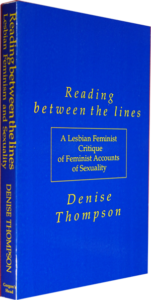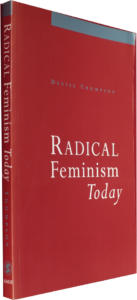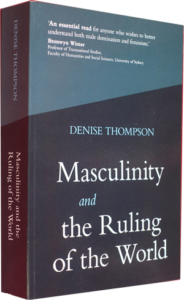 Reading Between the Lines: A Lesbian Feminist Critique of Feminist Accounts of Sexuality (1991) Reading Between the Lines critically examines recent feminist writings on sexuality from a radical feminist and lesbian feminist standpoint. It takes a stand against the libertarian emphasis current in many ‘second wave’ feminist writings on sexuality, and argues that such an emphasis is antithetical to feminist values.
Reading Between the Lines: A Lesbian Feminist Critique of Feminist Accounts of Sexuality (1991) Reading Between the Lines critically examines recent feminist writings on sexuality from a radical feminist and lesbian feminist standpoint. It takes a stand against the libertarian emphasis current in many ‘second wave’ feminist writings on sexuality, and argues that such an emphasis is antithetical to feminist values.
Early feminism saw the social construction of sexuality as one of the chief mechanisms for the male domination of females. Recently, however, this perspective has not been strongly represented in most self-identified feminist texts on sexuality. Reading Between the Lines attempts to redress this state of affairs.
It criticises the liberal tolerance of the libertarian ethic of sexual pluralism in these texts, their omission or marginalisation of lesbianism, their insistence on the sexual similarity of the sexes, their construction of the ‘straw woman’ of ‘cultural’ feminism, and the anti-feminist implications of the ‘anti-anti-pornography’ stance. At the same time, Reading Between the Lines argues the case for political lesbianism.
 Radical Feminism Today (2001)
Radical Feminism Today (2001)
What is feminism? How can ‘feminism’ be defined? Should feminism be defined? This book offers a timely and engaging account of exactly what feminism is, and what it is not.
Thompson questions much of what has come to be taken for granted as ‘feminism’ and points to the limitations of implicitly defining feminism in terms of ‘women’, ‘gender’, ‘difference’ or ‘race/gender/class’. She challenges some of the most widely accepted ideas about feminism and in doing so opens up a number of hitherto closed debates, allowing for the possibility of moving those debate further.
A fresh and sometimes controversial consideration of current academic feminist literature, Radical Feminism Today will be essential reading for all students of women’s studies and the sociology of feminism.
Denise’s comments on Radical Feminism Today
 Masculinity and the Ruling of the World (2020) argues that there is a world-wide culture of masculinity that breeds arrogant dissociated men who are the prime culprits in the depredations that have brought humanity to its present grievous condition. The argument is that male domination not only oppresses women, it distorts the whole of the social world. At the same time, the book argues that male supremacy is not the whole of the social world. There is also something that might be called ‘genuine humanity’, which provides a life-affirming force that resists the impositions and seductions of male supremacy. Five institutions are used to illustrate some of the ways in which male domination permeates the social world, institutions rarely, if ever, considered in terms of masculinity—capitalism, fascism, surrogacy, transsexualism and US ‘welfare reform’. All these institutions are interpreted in terms of their dissociation and arrogant male entitlement, even though at first sight they may appear to have little or nothing in common. This interpretation brings a new perspective to bear on the phenomenon of male supremacy and seeks to challenge the ideological subterfuges that maintain it. While it owes a debt to the many feminist writers that came before, by focusing on the system that does the oppressing the book undertakes to advance the feminist project that saw a resurgence in the 1960s and 1970s.
Masculinity and the Ruling of the World (2020) argues that there is a world-wide culture of masculinity that breeds arrogant dissociated men who are the prime culprits in the depredations that have brought humanity to its present grievous condition. The argument is that male domination not only oppresses women, it distorts the whole of the social world. At the same time, the book argues that male supremacy is not the whole of the social world. There is also something that might be called ‘genuine humanity’, which provides a life-affirming force that resists the impositions and seductions of male supremacy. Five institutions are used to illustrate some of the ways in which male domination permeates the social world, institutions rarely, if ever, considered in terms of masculinity—capitalism, fascism, surrogacy, transsexualism and US ‘welfare reform’. All these institutions are interpreted in terms of their dissociation and arrogant male entitlement, even though at first sight they may appear to have little or nothing in common. This interpretation brings a new perspective to bear on the phenomenon of male supremacy and seeks to challenge the ideological subterfuges that maintain it. While it owes a debt to the many feminist writers that came before, by focusing on the system that does the oppressing the book undertakes to advance the feminist project that saw a resurgence in the 1960s and 1970s.